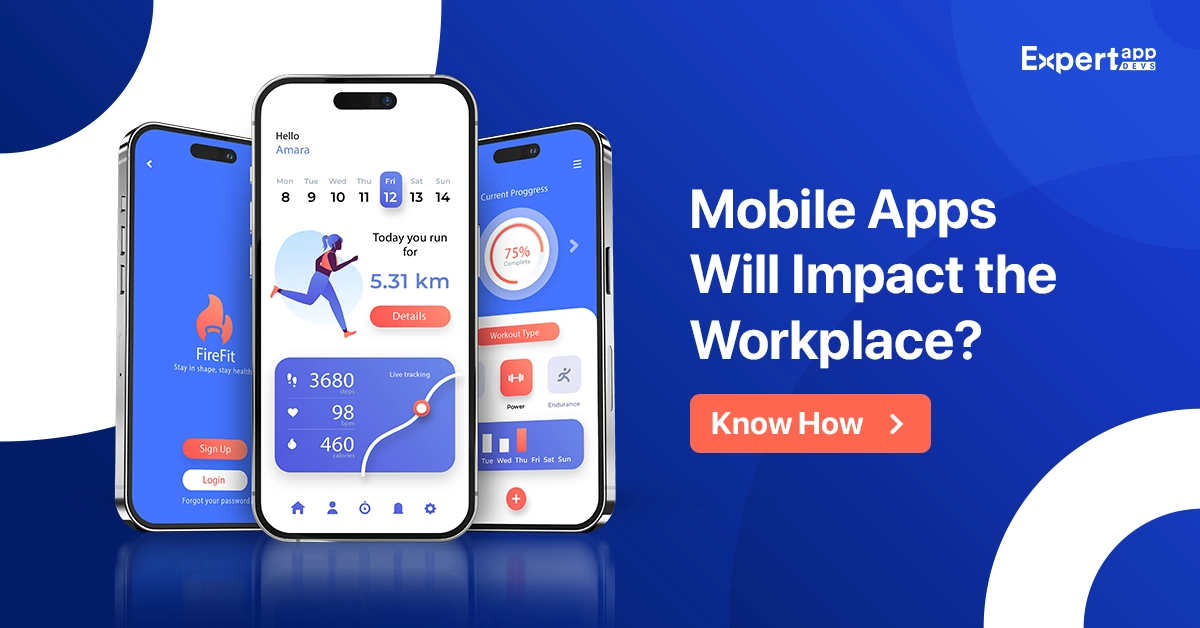How Mobile Apps Will Impact the Workplace?
Digital transformation is not just a buzzword. Almost all industry verticals now understand the immense potential behind this powerful strategy.
The world is gradually adopting digital transformation to accelerate growth and meet its scalability goals. Everyone will accept it as a norm to advance in this cut-throat competitive era.
The world before Covid-19 was different. However, the pandemic has completely revolutionized the way businesses function. Not just that, it has also transformed the workplace.
For example, earlier, people used to work from home when they were sick or had some home commitments. During the Covid-19 pandemic, the remote working culture was a new normal.
Also, organizations believed that remote working did not affect the performance and efficiency of the employees. Better work-life balance has made them more focused, goal-oriented, and efficient.
Even after the pandemic, organizations have started making work culture policies that benefit employees. The main goal was to help employees balance their personal and professional lives.
The digital workspace solution seems promising and employee-centric. Digital workplaces would help employees make their lives more balanced, stress-free, and with good work-life balance.
A study reveals that the global workplace transformation market will grow from $18.9 billion in 2022 to $69.9 billion by 2030. The expected CAGR is 17.7% during the period.
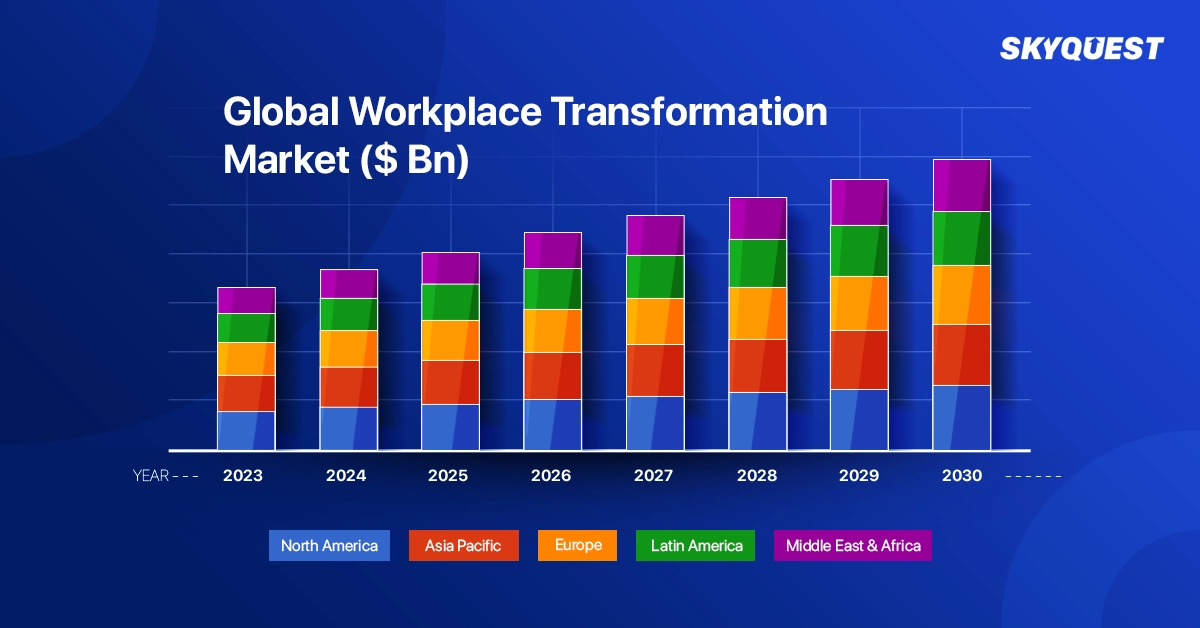
The Digital Transformation: Beyond Traditional Workplaces
In simple terms, the digital transformation of workspaces is the changes in how organizations operate with technological advancements.
For example, If you work from home and want to discuss a project with your colleague. Using the Zoom app is a classic example of digital transformation. Technology helps you connect with your team members to move things fast and communicate better.
The Main Goals Of Digital Transformation Must Be:
- To improve the performance and efficiency of employees,
- To enhance the efficiency of various business processes,
- To streamline workflows and processes,
- To mitigate human errors by automating processes,
- To manage day-to-day operations more efficiently and productively,
- To keep your employees motivated and focused,
- To encourage more collaborations with team members with the help of technology,
- To serve your customers better to improve relationships.
With the digital transformation of workplaces, you can actively understand the needs of your employees and other stakeholders. Organizations can respond quickly to evolving market conditions and introduce new, research-based, data-driven processes for maximum ROI.
With digital transportation of workspaces, employees can work with greater trust and transparency with each other. Also, organizations can keep pace with the evolving technological landscape and meet their future scalability goals.
#1. The New Era of Digital Workspaces
Replacing traditional workspaces with digital workspaces is the right solution to organizations' challenges after the COVID-19 pandemic. With digital workspaces, businesses can streamline processes, automate operations, and help employees achieve work-life balance.
Furthermore, a digital workspace solution also can mitigate risks and improve team collaboration. Organizations can achieve these goals with various team management and project management tools.
✔ The Shift From Office-Centric To Remote And Hybrid Models
Gone are the days when people used to commute daily to their offices. Covid-19 struck, and businesses had to embrace the culture of working from home. Against all speculations and doubts, this new culture proved to be a successful one.
Employees were highly productive and efficient and took on work-related challenges wholeheartedly. Businesses replaced office meetings with Zoom meetings, but this did not affect participation and engagement.
Once the pandemic ended, some organizations continued with remote working, while some embraced the hybrid model.
✔ Role Of Mobile Apps In Fostering Collaboration And Productivity
Mobile apps were instrumental in making the work-from-home culture successful. Can we forget our dependence on mobile apps like Slack, Skype, Toggl, Microsoft Teams, and others for smooth communication?
With these mobile apps' availability, employees could efficiently communicate and collaborate with other team members. These mobile apps, with their intuitive user interfaces, helped employees and organizations achieve their goals without affecting productivity and efficiency.
#2. Mobile Apps: The Heartbeat of Modern Workflows
In common terms, digital transformation is about leveraging the latest digital technologies to redefine existing business processes and workflows. Modern mobile apps with impeccable capabilities can help businesses accelerate growth and drive maximum ROI. They can integrate technologies like AI-ML, IoT, Metaverse, Blockchain, etc.
Regarding digital workspace transformation, mobile apps can help employees collaborate effectively.
✔ Integration With Cloud Platforms And Decentralized Systems
Mobile apps can easily be integrated with cloud platforms for data security and accessibility. With such integration, anyone with authentic permission controls can access the app from anywhere in the world. All they need is an active internet connection. Not just that, integrating the mobile app with cloud platforms helps reduce data redundancy, enhance user experience, and integrate databases.
Also, decentralized systems like Blockchain can make the app more secure, transparent, and speedy. Such integrations offer more data control to the owners and make the app resistant to hacking and manipulation. Experts believe that decentralized systems are more secure and efficient than centralized systems.
✔ Enhancing Real-Time Collaboration And Decision-Making
Mobile apps can help employees to collaborate in real time with advanced collaboration and communication features. Some features you can develop in mobile apps are real-time communication, recognition, reward systems, real-time data analytics and reporting, user-friendly and intuitive UI, employee surveys and feedback, etc.
With mobile apps, you can also gather valuable data insights to help you make data-driven decisions.
Mobile App Development: Pioneering Trends and Innovations
Let's now check out mobile app development methodologies with the latest mobile app development trends and innovations. Since its inception, mobile app development has changed drastically. Simple apps have replaced high-end, AI-centric, and feature-rich mobile applications.
#1. The Evolution and Revolution of Mobile App Development
✔ Milestones From The Past And Their Impact On Current Trends
Earlier, mobile apps were simple in features and functionalities. The Apple App Store and Google Play Store were released in 2008 and 2009, respectively. These releases have opened up new opportunities and possibilities for developers and businesses to develop mobile apps that can help maximize revenues and growth.
Earlier mobile apps were built with primary programming languages like Java. The introduction of smartphones was the first giant leap that changed how mobile apps were developed.
Smartphones were advanced devices with better connectivity and superior hardware. Also, at the same time, Android and iOS operating systems were introduced. Now, developers have high-end mobile app development tools and frameworks to make commendable mobile apps with highly advanced features.
Today, developers have advanced programming languages like Kotlin and Swift. They have cross-platform mobile app frameworks like React Native and Flutter to make applications that can run on Android and iOS devices. Creating an app is like sailing for developers with advanced app development tools and frameworks.
Advanced designing tools can help developers build highly intuitive and flawless user interfaces to engage users with gamification options. Top Mobile app development technologies like AR, VR, AI, IoT, and Blockchain can help developers build highly advanced features to offer users a unique, satisfying user experience.
✔ The Metamorphosis Of App Development Methodologies
Multiple mobile app development methodologies allow developers to build striking, feature-rich mobile apps. Let's briefly discuss them:
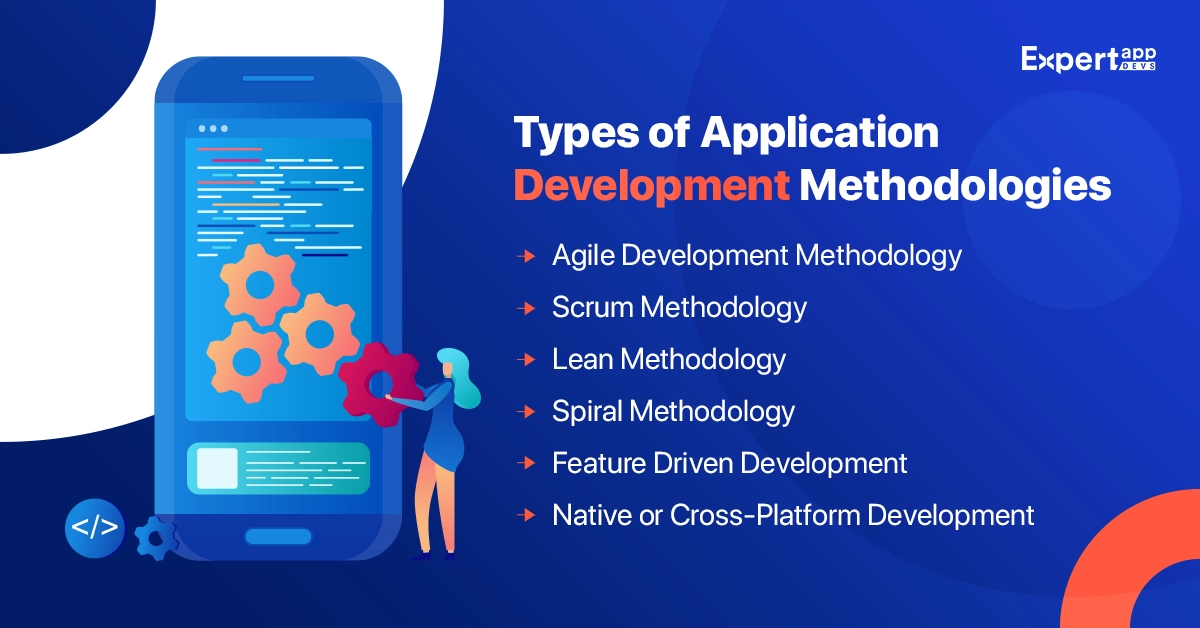
➡Agile Development Methodology
The agile development approach is one of the most preferred app development methodologies to build error-free apps. The agile approach helps developers identify and address errors and bugs throughout development.
➡Scrum Methodology
The Scrum approach is also popular among developers. It is a part of the agile approach but more prescriptive. However, team collaboration and commitment are very rigid in this approach. You will have to appoint a Scrum master who will be responsible for the understanding and implementation of Scrum.
➡Lean Methodology
The lean development approach estimates risks, identifies bottlenecks, defines waste, and optimizes resources. The development team will plan a strategy that help optimize the app development process by reducing time and effort.
➡Spiral Methodology
You can use the Spiral approach when working with an extensive mobile app development project with higher risk estimation. Developers develop a set of development iterations, and each iteration loop has a set of steps like planning, risk analysis, mitigation, engineering, and progress review.
➡Feature Driven Development
Here, multiple developers work simultaneously on the project, each responsible for different feature development.
➡Native or Cross-Platform Development
Native app development is about using platform-specific programming languages to build native-specific apps. Here, developers will have native-specific development kits and environments. cross-platform development is about developing two separate mobile apps for Android and iOS platforms using a single codebase. It requires less effort and time.
#2. Forefront Trends in Mobile App Development
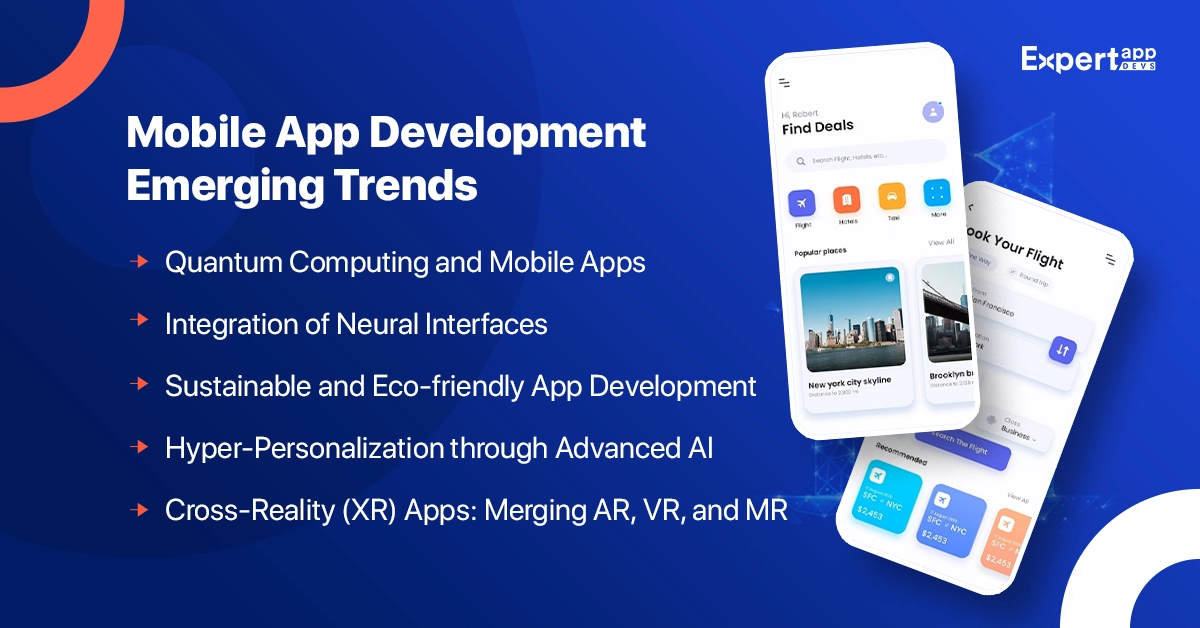
✔ Quantum Computing and Mobile Apps
Quantum computing is a fast-paced technology based on quantum mechanics and physics principles. By unleashing the potential of atomic and subatomic particles, you can access more states than binary by extracting power from a quantum computer in quantum bits.
Quantum computing can be used in mobile app development to improve security, increase productivity, reduce costs, and increase speed. Professional mobile app development services now look for highly focused and faster solutions to improve user experience and satisfaction. Quantum Computing can become a trendsetter to achieve it.
✔ Integration of Neural Interfaces
Research on neural interfaces shows much improvement, especially in healthcare and medicine. A neural interface is an electronic device integrated with the nervous system to record or stimulate activities. The whole methodology works in sync with information exchange. The device introduces signals through the neuron's electrical stimulation and records information by monitoring the neuron's electrical activity.
Researchers are exploring various ways to integrate neural interfaces into mobile apps to offer accessibility to people with disabilities. Though it is still in its primary stage, the technology looks promising and will be adopted by mobile app developers in the future.
✔ Sustainable and Eco-friendly App Development
Another remarkable mobile app development trend worth mentioning is sustainable development. The main goal of sustainable app development is to reduce the environmental impact of the development process.
How Can You Achieve Such Sustainable App Development? Well, There Are Many Ways:
- You can maximize energy efficiency.
- You can choose a green hosting service provider for your app's hosting.
- By optimizing app code to consume fewer resources.
- By extending the life of the devices.
- Educating users about the app's impact on the environment.
- By reducing electronic waste.
✔ Hyper-Personalization through Advanced AI
This is the era of personalization. Millennials want more than just high-quality products or services; they seek gratification. They want experiences that enrich their lives. The only way to achieve it is through personalizing their shopping journeys.
Advanced Artificial Intelligence AI can help businesses to offer hyper-personalization to their users. Hyper-personalization uses AI and other application development technologies to create highly granular, user-specific, data-driven products and services. Some technologies that help develop hyper-personal products and services are Machine Learning, the Internet of Things IoT, Artificial Intelligence, Blockchain, Augmented Reality, Virtual Reality, etc.
AI algorithms collect data from various sources and process and analyze data to create highly personal products, services, or offers for users. You must have seen a segment called "Customers Also Bought" on ecommerce websites. It is the perfect example of hyper-personalization.
✔ Cross-Reality (XR) Apps: Merging AR, VR, and MR
This concept is gradually gaining momentum because of the unparalleled promises it holds in its sleeves. In simple terms, cross-reality apps are developed using various immersive reality technologies.
Here, physical and digital objects are combined in real-time to create highly intuitive and immersive digital experiences for users. Developers can use technologies like Augmented Reality (AR), Virtual Reality (VR), Mixed Reality (MR), and Cinematic Reality (CR) to create cross-reality apps.
With cross-reality apps, businesses can offer highly immersive user experiences to their customers to enrich their journeys. These apps delicately blur the lines between the digital and physical worlds and open a new mixed world for users.
The Nexus of Mobile Technologies and Enhanced User Experiences
User experience plays a massive role in an app's overall engagement. For example, a study reveals that 62% of users will abandon an app that is hard to navigate.
Another study states that 74% of consumers are partial to buying based on user experience alone.
You need to build a mobile app that is user-friendly, easy to navigate and offers an unmatched user experience. From design to features, you must carefully craft a plan that helps you achieve your UX goals.
#1. Crafting Immersive User Experiences
Using AR, VR, AI, and Machine Learning, developers can develop highly immersive and intuitive mobile apps offering superlative user experiences. Technological advancements have enabled developers to build mobile apps that mesmerize your audience.
Developers can achieve Immersive user experiences by blending highly engaging visuals, sound, and technologies like Augmented Reality and Virtual Reality. These advanced mobile apps can take users to a different world where they can interact and manipulate the environment.
IKEA, one of the top-notch furniture brands, allows users to check the furniture items in their homes through AR before they purchase them. Also, with advanced AI, the brand offers personal furniture item recommendations to users.
✔ The Rise Of Sensory Technologies In Apps (Haptic Feedback, Spatial Audio)
Another point is sensory technologies developers can use to build mobile apps to enhance the overall user experience. Such technologies allow users to have digital sensory experiences that they experience in the real, physical world. It is also called the Internet of Senses. The technology blends different digital sensory experiences with local surroundings.
Users can have augmented vision, hearing, touch, and smell through these sensory technologies. Some sensory technologies are volumetric displays for flabbergasting visuals, augmented hearing, and spatial audio, haptic for tactile stimulation, Olfactory for smelling in virtual environments, and virtual reality. Emerge Haptics, Apple's New Vision Pro, and Olfactory interfaces are prime examples of sensory technologies.
✔ Designing For A Global And Diverse User Base
Even mobile app designs have touched the new sky regarding accessibility and originality. Mobile app designers develop high-class designs that address the vulnerabilities of earlier design issues. Modern mobile app designs perfectly cater to a diverse global user base with techniques like neumorphism, user-generated content, bottom navigation, glassmorphism, voice user interfaces, etc.
Icons, advanced animations, and emojis are widely used in mobile app designs to improve the overall user experience globally. Also, designers use micro-interactions to make the experience more natural and interactive.
#2. Innovations Driving User-Centric App Development
Mobile app developers constantly try to develop apps that keep the users first. User-centric app development is the key to driving success. Dynamic user experience is the need of the hour.
User-centric app development is all about adding user-centric features and functionalities to the app and enhancing the app's security. Also, you can have data-driven recommendations, a user-friendly interface, and a satisfactory user experience.
✔ Biometric Authentication And Security
Security is a prime concern for businesses. Ensuring the app's security while staying compliant with data security regulations is crucial. Modern mobile app development provides high-end security to prevent cyber-attacks and mitigate data-related breaches. Biometric authentication, two-way encryption, and other security measures can help strengthen the app's security.
✔ On-Device Machine Learning For Real-Time Responses
On-device machine learning is a new concept in which an ML model processes data directly on a mobile device. The machine processes input data like images, videos, or text within the device. You don't need to send the data to the server for processing.
It also strengthens the app's security, as data does not travel anywhere. With on-device machine learning, you can get real-time responses and help support your customers better.
✔ Edge Computing in Mobile Apps
Edge computing can help reduce latency requirements and speed up network performance by keeping computing resources closer to the original data source. Here, data storage units, computing devices, and other resources are kept closer to other data sources like IoT devices. Edge computing helps get faster insights, improve response times, and get superior bandwidth availability.
Developers can use edge computing in mobile app development to achieve high performance and speed. Some other benefits are valuable insights, predictive capabilities, smart decision-making, reduced network load, and others.
Addressing the Contemporary Challenges in Mobile Software Development
Even with the availability of development tools and advanced mobile application development technologies, there are contemporary challenges that developers and businesses have to address. We will discuss some of them in detail:
#1. Navigating the Complexities of Modern App Development
✔ Ethical considerations in app development (data privacy, inclusivity)
Developers have various ethical considerations to address while developing the app. For example, developers must strengthen the app's security to prevent data breaches. In addition to that, they also must keep the app compliant with data security regulations.
Also, a mobile app receives data from various sources. Such user data might contain confidential information about users. App owners must use such sensitive data wisely and responsibly.
Furthermore, developers must take meaningful diversity and inclusion initiatives to make the app inclusive for all users, including users with disabilities.
✔ Balancing innovation with user trust
Developers and app owners must stay transparent with the users. Using innovative and advanced technologies must not breach users' trust. Ethical implementation of technologies like Artificial Intelligence must be done to encourage transparency and responsible data usage.
#2. Strategies for Overcoming Modern Development Barriers
✔ Embracing open-source frameworks and tools
Using open-source frameworks and tools is the best way to overcome modern development barriers. Such tools ensure transparency, encourage collaboration, and are highly cost-effective. For example, developers can access the source code and alter it based on their project requirements, Which can improve the security and scalability of the app.
✔ Continuous learning and upskilling in the face of rapid technological changes
Developers must also learn and upskill themselves to stay updated with rapid technological changes. This is the time to be a student throughout their careers. The key to success is to adopt new application development technologies and mobile app trends.
The Horizon of Mobile App Technologies: What Lies Ahead
What is the future of mobile apps? What are the technologies that will stay ahead in the future? Let's discuss.
#1. The Confluence of Emerging Technologies
Artificial Intelligence is one of the most promising technologies to reshape mobile app development. It has immense potential to change the face of mobile apps. AI, Machine Learning, Augmented Reality, Virtual Reality, Blockchain Technology, the Internet of Things, Progressive Web Apps, Wearable technology, and Cloud Integration will pave the way for modern mobile app development.
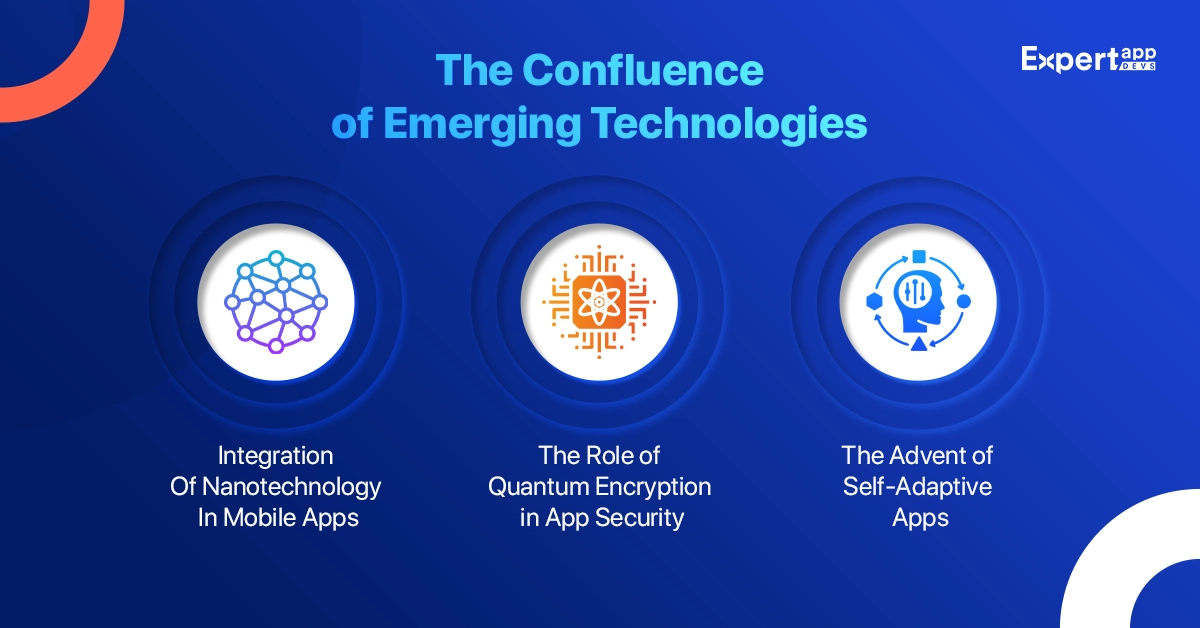
✔ Integration Of Nanotechnology In Mobile Apps
Most smartphone devices use Organic LED (OLED) for their display screens, a nanotechnology application. In the future, nanotechnology will play a huge role in mobile apps. Nanotechnology can be used in mobile apps like
- Magnetic Random Access Memory (MRAM) to keep data even after a system crash.
- Developers can use Nanotechnology for self-cleaning surfaces, transparent electronics, flexible materials, waterproofing, and disease detection.
✔ The Role of Quantum Encryption in App Security
Quantum Encryption is a technology that leverages quantum mechanics principles to ensure secure communication and data exchange between two devices or networks. Also known as Quantum Cryptography, this technology relies on properties of quantum particles like Photons.
Quantum encryption can help in strengthening the security of the app. For example, previous encryption methods have security vulnerabilities. On the other hand, quantum encryption ensures the transmission of encryption keys that cannot be intercepted without detection.
This technology can also help tamper detection, user authentication and authorization, and protection against quantum attacks. With these features, you can create highly secure and best future apps.
✔ The Advent of Self-Adaptive Apps
A self-adaptive system is software that can adjust its behavior based on its perception of the exterior environment. A self-adaptive mobile app can adapt to runtime changes. It automatically and dynamically adjusts its features and functionalities based on runtime changes. Soon, the adoption of self-adaptive mobile apps will increase because of the possibilities it presents to businesses.
#2. Predicting the Game-Changers: Apps That Will Define the Next Decade
✔ The Potential Of Decentralized Apps (dApps) In Mainstream Usage
Decentralized apps are mobile apps or software that run on a peer-to-peer network of systems or computers. The main benefit of developing dApps is that no single person controls them. As the name suggests, decentralized apps don't have a single entity that controls them. For example, if one network member makes some changes, all the stakeholders will get notifications about it.
BitTorrent, Tor, and Popcorn Time are decentralized apps that run on multiple computers under a P2P network. Here, multiple participants can feed or seed content and make changes to content.
In a decentralized system, a developer can put an app in a Blockchain network. All the stakeholders can add messages to it, and no one can delete it.
Many industry verticals use decentralized apps like retail, finance, supply chain management, real estate, healthcare, and education. The possibilities are endless for this emerging concept, and developers will soon use it in mainstream mobile app development.
✔ How Apps Will Leverage The Metaverse And Digital Twins?
Metaverse is a highly immersive and engaging network of virtual worlds where users can interact with other participants. They can chat, shop, play games, and do other stuff they regularly do in the physical world.
On the other hand, a digital twin is a virtual, superficial model of a physical product of the real world. The best thing about a digital twin is that it looks and behaves intelligently like a physical object.
Mobile apps can integrate these fascinating technologies to offer highly immersive and top-notch user experiences. For example, the Metaverse can perfectly blur the fine line between real and virtual worlds. The Metaverse technology can build mobile apps for various genres like social networks, gaming, education, professional work, shopping, training, and healthcare.
The future of application development is fascinating and highly promising with the invention of these superlative technologies.
Conclusion
Next-gen mobile apps will impact the lives of people massively. Technologies like Metaverse, IoT, AI, ML, Blockchain, AR, and VR will help developers create highly captivating user experiences.
Businesses can leverage these technologies and development trends to serve customers better and streamline their processes. Also, we can use mobile apps as an asset to develop a digital workspace solution.
Developers must focus on delivering high-end, feature-rich, highly personalized mobile apps to help achieve business goals. They should be on a learning curve throughout their careers to come up with appealing mobile apps to accelerate growth. Learning and implementing new technologies in mobile app development can help them create awe-inspiring, future-ready apps.
Expert App Devs is a leading mobile app development company with a team of dedicated developers. Our developers can lead from the front to develop highly immersive and user-specific mobile apps.
You can hire dedicated mobile app developers at just $22 hourly or $2500 monthly through a quick hiring process. Our dedicated developers will work solely on your project to deliver the best timely solutions. Hire dedicated developers now.
 Jignen Pandya
Jignen Pandya
